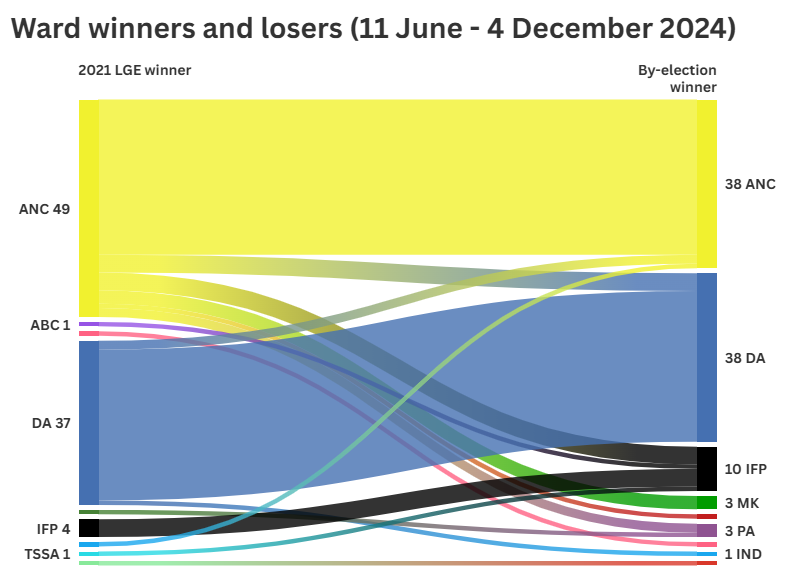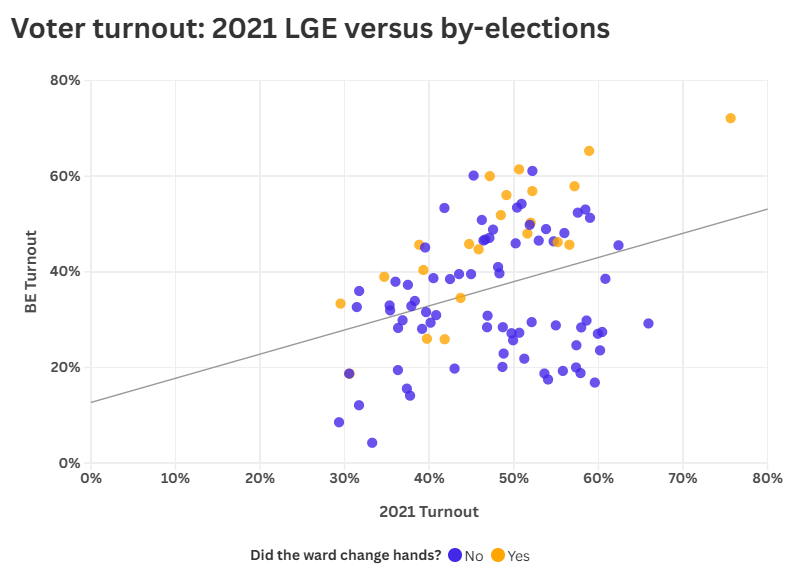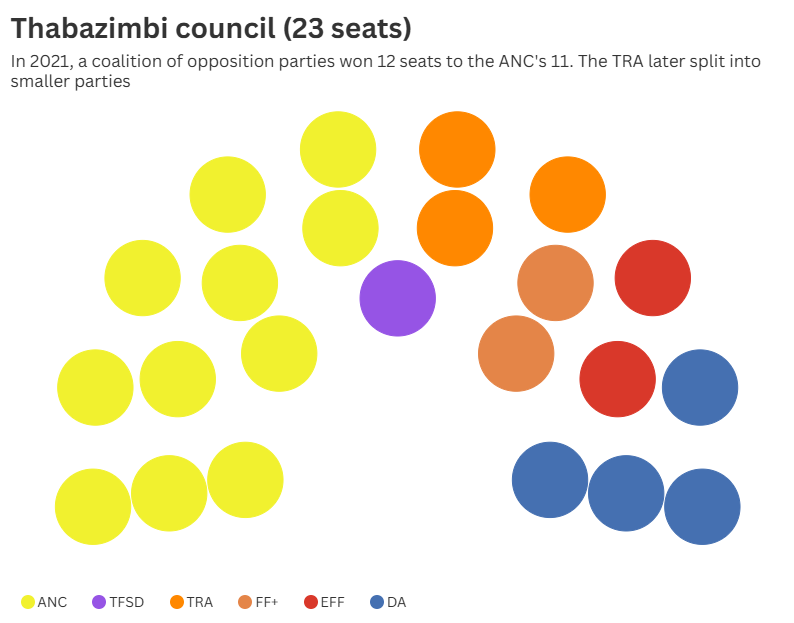By-elections: May - December 2024
Trends in by-elections contested since the General Election
Local government in South Africa is many things: a laboratory for service delivery, a cacophonous canary in the coal mine of the coalition mediocrity, but it is never boring. Municipal by-elections are already weird before the voting even begins: almost all of them are ward by-elections with their first-past-the-post (FPTP) electoral rules.
Nobody in South Africa really knows what to make of these ward seats and the ward councillors that occupy them. Ward councillors are the only form of direct democracy the country has, but they are employed part-time and mostly kept around as voting fodder for battles in council. Some of them quit in frustration, others defect, and some genuinely useless ones are expelled from their parties. We don’t seem to prioritise the human faces of basic service delivery.
For all of the above mentioned reasons, and one or two more, we hold by-elections. This post looks at trends in by-elections held since the May general election up to the by-elections last week on 4 December. There is a particular focus on the by-election held last week following the dissolution of the Thabazimbi municipal council and the reelection of every council seat (12 wards and 11 PR seats).
Some of these trends, like the trajectories of various parties or patterns in voter turnout, have been clear since the 2021 local government election. Other trends are still emerging, such as the effect of MK and the growth of the PA.
This report includes screenshots of interactive Flourish visualisations. The original visualisations are available online through the links below each screenshot or as an interactive slideshow via this link.
List of parties and party abbreviations
Abbreviation Party
ABC Abantu Batho Congress
ANC African National Congress
ALJ Al Jama-ah
DA Democratic Alliance
EFF Economic Freedom Fighters
IFP Inkatha Freedom Party
MK uMkhonto weSizwe
LPSA Labour Party of South Africa
TFSD Thabazimbi Forum for Service Delivery
NFP National Freedom Party
TRA Thabazimbi Residents Association
SSDF Setsoto Service Delivery Forum
TSSA Team Sugar South Africa
By-election winners and losers since the 2024 general election
There have been 96 wards contested in by-elections since the national / provincial election (NPE) on 29 May, plus the 11 PR seats in Thabazimbi. The Sankey flow chart below shows how many ward seats were retained or lost by the various parties.
The ANC has been the clear loser over the period, contesting 49 wards and losing 14 (four each to the DA and IFP, three to MK, two to the PA and one to the LPSA). The party pared its losses by picking up two DA wards and one from an independent candidate to end the period with a net loss of 11 wards.
Smaller parties were also among the losers, with the ABC, GOOD, SSDF, and TSSA all losing a ward apiece to the IFP, PA, EFF and IFP respectively. The TRA (two seats) and TFSD (one seat) also lost PR seats in Thabazimbi.
The IFP was the most successful party over the period, winning four wards off the ANC and one each from the ANC and TSSA for a net gain of six seats. MK and the PA tied for second place with gains of three wards each, MK winning three ANC wards and the PA winning two ANC wards and one ward from GOOD. The LPSA, EFF and MK each won one PR seat in the Thabazimbi by-elections.
The DA ended up one seat in the black, losing three ward seats and gaining four. It lost two seats to the ANC and one to an independent candidate but won back four seats from the ANC. These figures include the ward seat in Thabazimbi but not the three PR seats that the party also retained in December.
Close calls and smaller pluralities
The wins-and-losses columns don’t tell the full story as many ‘safe’ wards were retained by very small margins. Ward elections are the only first-past-the-post elections in South Africa, where the winner may receive less than 50% of the vote - sometimes significantly less.
Historically, the northern half of KwaZulu-Natal and parts of the Western Cape have had some of the fiercest showdowns. In KwaZulu-Natal, the ANC, IFP and NFP have fought each other to a standstill since 2011, but MK threatens to eclipse any past rivalries. In the Western Cape the DA has contended with the ANC and various regional parties, more recently GOOD and the PA. The recent Thabazimbi by-elections were also bitterly fought as chancers and prospectors came for the gold rush of PR seats.
The bar chart below shows the 12 most competitive ward contests since June, six of which were lost by the incumbent:
It is no coincidence that five of the closest wards were in Thabazimbi. When the municipality was dissolved the municipal by-election had the status of a general local election, with all 23 seats up for grabs. Thabazimbi’s crowded field included 16 parties and three independent candidates, all fracturing the vote. Because of South Africa’s party-centric electoral system, parties contest wards in a local general election that they had no hope of winning, just to eke out one or two PR seats. That is how the LPSA and MK won their PR seats.
In Thabazimbi, the ANC retained four close wards with the LPSA and DA nipping at their heels. The party also lost a close ward to the LPSA and might have lost a second to the DA had the FF+ not split the opposition vote.
Ward 8 was retained by the ANC with just 583 votes, squeezing past the EFF (446 votes) and the LPSA (359 votes). The party won Ward 6 with just 252 votes to the LPSA’s 199 votes, the EFF’s 110 and the DA’s 107. In Ward 4 the ANC won by just nine votes, winning 754 votes to the DA’s 745, the FF+’s 238 and the EFF’s 182 votes.
The party won Ward 5 with relative ease, winning 618 votes to the MK’s 337, the LPSA’s 222, the EFF’s 200 and the DA’s 155. The LPSA won Ward 3 with 423 votes to the ANC’s 295 and the EFF’s 230.
In Newcastle the DA took Ward 5 from the ANC with 352 votes to the IFP’s 308, the ANC’s 256 and the EFF’s 225. TSSA lost Ward 28 to the IFP, who won 852 votes to MK’s 613, TSSA’s 361 and the ANC’s 283.
The ANC lost two Umzumbe wards as its influence in southern KwaZulu-Natal continued to wane. MK won Ward 11 with 698 votes to the IFP’s 681, the ANC third with 576. Ward 2 was won by the IFP with 740 votes, MK second with 582 and the ANC third with 537 votes. The party did successfully defend Ward 24 in neighbouring Ray Nkonyeni, winning 1 269 votes to MK’s 1 091 and the IFP’s 994 votes.
Voter turnout
Voter turnout is typically lower in local government elections than national / provincial, and turnout for by-elections is lower still. By-elections are held in the middle of the working week and voter interest is low. However, ward by-elections have become more competitive and political parties campaign harder than ever, increasing turnout in some by-elections above the LGE turnout.
The scatter plot below shows the relationship between the 2021 LGE voter turnout and the by-election turnout in the respective wards. Each dot represents a ward, with 2021 turnout on the horizontal axis and by-election turnout on the vertical. Higher turnout in the general election is correlated with higher by-election turnout, as you would expect, but contested wards have a significantly higher turnout in by-elections.
The wards that changed hands, usually a good indicator of contestation, are represented by the yellow dots. Almost all of them are above the trendline. In contrast, almost every single one of the wards with the lowest by-election turnouts were safe DA seats. In 11 of the 15 wards where by-election turnout fell below 20%, the DA had won the ward with over 60% in 2021.
Thabazimbi
Wednesday’s by-election included a complete revote in Thabazimbi after the municipality was dissolved. Thabazimbi’s governance problems have been years in the making, and stem largely from the ANC’s unwillingness to accept defeat at the polls.
Thabazimbi is a local municipality in the Waterberg district of Limpopo. It is in the south-west corner of the province, bordered by the North-West province to the south and Botswana to the north and west. The municipality has twelve wards and 23 council seats in total (12 ward, 11 PR seats).
The 2016-2021 administration
The 2016 local government election (LGE) was a seismic one for the ANC and the country. The party experienced unprecedented losses across the country, losing majorities in municipalities that were previously impregnable. Thabazimbi was one ANC fortress successfully breached by the opposition.
The ANC won only ten of the 23 council seats in 2016. The DA (five seats), the EFF (five), the Thabazimbi Residents Association (TRA, two seats) and the FF+ (one seat) installed a coalition government with a TRA councillor, Midah Moselane, as mayor. Moselane was removed by her own party in 2017 and lost her court appeal against her dismissal.
The ANC unsuccessfully brought motions of no confidence against the DA speaker and chief whip in August 2019, calling on the MEC for cooperative governance to intervene. (The speaker resigned a month later.)
The ANC and the coalition clashed again in June 2020 over the latter’s decision to suspend the municipal manager.
The 2021 election
The ANC won 11 seats in November 2021, still finding itself in the minority. Although there was a decline in the fortunes of the DA (four seats) and the EFF (two seats), local opposition parties filled the gap. The TRA (three seats) and the FF+ (two seats) grew and a new party, the Thabazimbi Forum for Service Delivery (TFSD) won a seat.
The opposition coalition remained viable despite the growing acrimony between the DA and EFF across the rest of the country. The DA led a new coalition and received the mayoral chain while the TFSD councillor was elected speaker and a TRA councillor was voted in as chief whip.
In October 2022 the ANC caucus passed motions of no confidence against the executive and elected a new mayor. The DA and opposition parties accused the ANC of holding illegal elections and took the matter to court, where the ANC-elected mayor and speaker were interdicted from taking up their positions.
Despite the court order and the intervention of the provincial MEC for cooperative governance, no amicable solution was found and by January 2023 there were two parallel councils, one DA-led and one ANC-led.
The ANC mayor was removed through a motion of no confidence and replaced by Louisa Shongwe in March 2023. Shongwe herself was removed in May and replaced by Aaron Mokgehle in a council meeting that was marred by accusations of violence and intimidation by ANC back-benchers. Mokgehle was the choice of the ANC’s provincial structures but was quickly dubbed the ‘mayor from hell’ after interfering with the supply chain management division and using an unauthorised vehicle.
In October, the Polokwane High Court found that the removal of the DA mayor and other opposition parties was irregular, ordering the reinstatement of opposition councillors and the removal of ANC office bearers.
The ANC appealed the court’s decision before finally withdrawing the appeal in July 2024. In September the MEC for cooperative governance dissolved the council, triggering the by-elections last Wednesday.
By-election results
The by-election on December 4 brought new parties into the council at the expense of ANC and TRA seats.
The ANC lost a ward seat to the LPSA. The LPSA is the political arm of the Association of Mineworkers and Construction Union (AMCU) and the Thabazimbi by-election was the party’s first foray into elections. In addition to the ward seat, the LPSA also won a PR seat, as did the EFF and MK.
The council visualisation shows the new composition of the Thabazimbi council.
It is not clear whether a working coalition can be formed yet, but it is likely that the EFF will remain outside of a formal coalition agreement.










